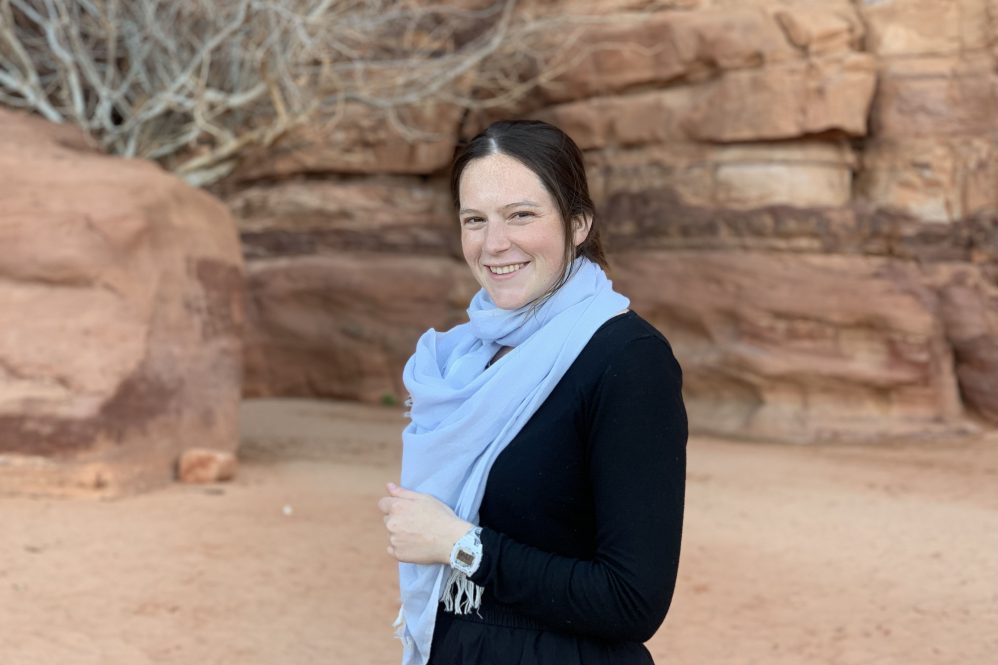Shae Heitz ’24 started classes at the UConn School of Law on the same day the United States completed the withdrawal from Afghanistan. She said a switch went off in her head as she realized what kind of legal work she wanted to do, prompting her to join the UConn Law chapter of the International Refugee Assistance Project in her first year.
Heitz is continuing to pursue that effort as she studies abroad this semester as a visiting postgraduate fellow at the University of Nottingham’s Human Rights Lab in England. While abroad, she traveled to Jordan to take part in the IRAP Jordan program aiding refugees from other parts of the Middle East who are seeking resettlement, funded by the UConn Human Rights Institute. One of nine students from the U.S. and Canada, Heitz helped conduct intake interviews with refugees and write referrals to the United Nations High Commissioner for Refugees.
“One of the joys and challenges of work like this is we can make a difference where we can, but we can’t do everything,” Heitz said. “I enjoy getting to work at a small level, one-on-one with people. It’s hard when these people feel like they’ve told their story dozens of times, and no one has helped them. Even if I can just help them for a few hours, I think it’s what I was meant to do.”
She cited a statistic from the United Nations High Commissioner for Refugees that there will be 117.2 million people forcibly displaced or stateless in 2023, compared to 78 million before the start of the Ukraine war. Less than 1 percent of refugees are considered for resettlement, according to the United Nations.
Working with the UConn Law chapter of International Refugee Assistance Project and in the law school’s Asylum and Human Rights Clinic have given Heitz experience interviewing refugees. The chapter coordinated projects in which students worked with attorneys at a naturalization clinic and with Integrated Refugee and Immigrant Services in New Haven. The group also organized speaker events on topics such as career advice and how presidential administrations affect immigration policy as well as a workshop on interviewing people who have experienced violence or other difficult situations. The UConn Law chapter will be recognized with the Excellent Chapter Award during the national organization’s Pro Bono Appreciation Week, starting April 17, 2023.
Last year, Heitz worked with the same IRAP Jordan program remotely, but contributing virtually made it harder to connect and convey empathy with clients. She also has experience interviewing clients both with the UConn Law chapter, of which she will be chapter director next year, and while working in the law school’s Asylum and Human Rights Clinic. This was the first time, however, she had interviewed clients in the country they were looking to leave.
“It felt very heavy,” Heitz said. “You want to do as much as you can. Sometimes all you can do is listen and support. When we interview these people, it’s not a typical client interview. You jump right into the worst things of their lives. But you have to remember that these are students, musicians, athletes, or poets and they have so much more to their lives than just this horrible story of them fleeing danger. They don’t lose those parts of their lives.”
Working with a partner and an interpreter, Heitz interviewed clients about why they fled their home countries and what challenges they face in Jordan. She then wrote a referral, a persuasive piece to convey why the client, typically with their family, deserves to be resettled in a third country. Referrals would include information about family reunification and any protected category that applies to the clients, perhaps as women or children at risk, survivors of violence or torture, individuals with medical needs, or those in need of legal or physical protections.
The program gave Heitz the chance to work with, befriend and learn from students from other chapters, attorneys from all over the world and interpreters who have vast experience in the Middle East. It also gave her the chance to learn more about Jordan. She took additional time to travel in Jordan, including visiting Wadi Rum, a valley cut into the sandstone and granite rock also known as the Valley of the Moon.
“It’s a place with so much history,” she said. “And it has been a place that so many people have resettled. Like anywhere, there’s such a complex history and some refugees have had a harder time being accepted than others, and that was challenging to hear. From a non-working standpoint, exploring the country was incredible. It’s a beautiful country with such a rich culture.”



